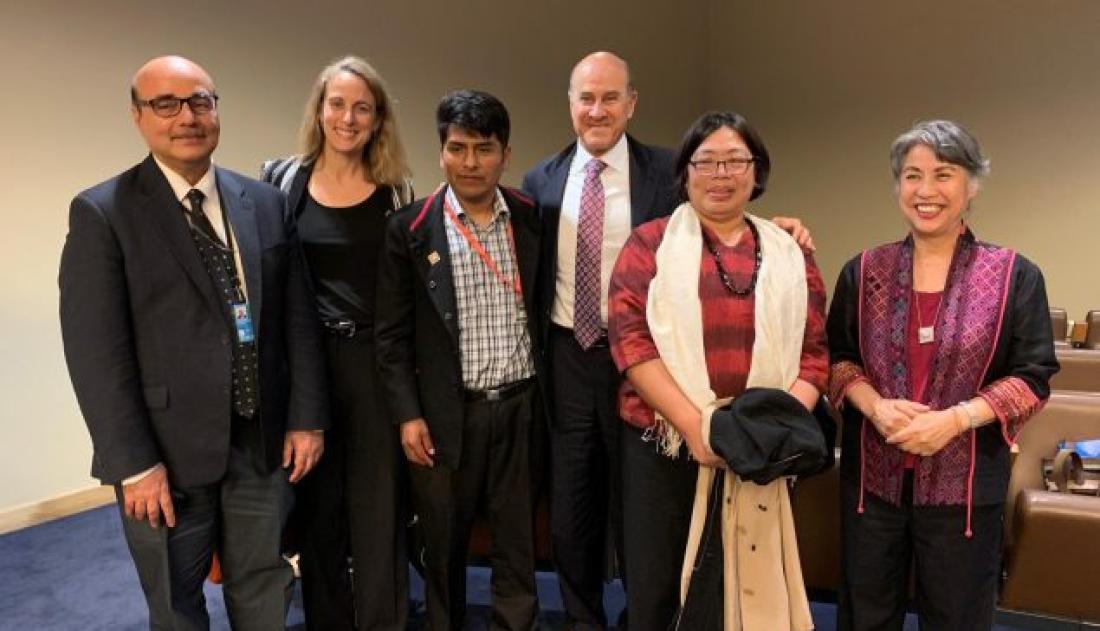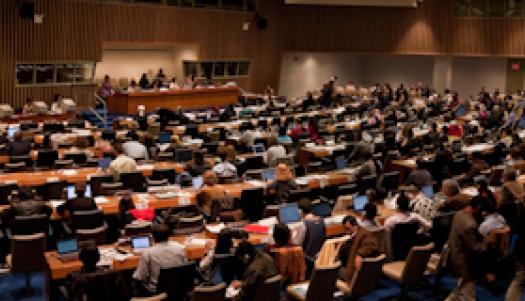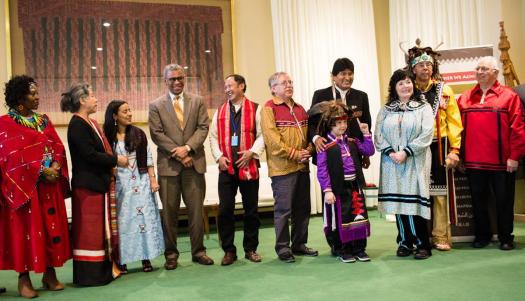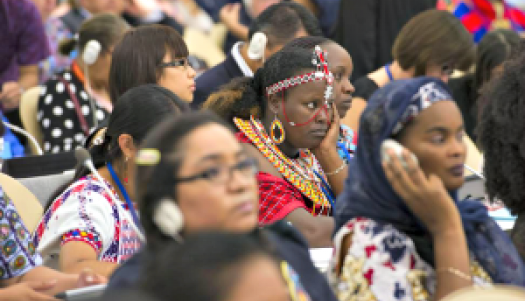
The fourth annual Multi-stakeholder Forum on Science, Technology and Innovation for the Sustainable Development Goals (STI Forum) took place on 14–15 May 2019 in UN Headquarters, New York. The theme of the STI Forum 2019 was “STI for ensuring inclusiveness and equality, with a special focus on SDGs 4, 8, 10, 13, and 16“.
The theme of Session 8 of the STI Forum was ‘Linking science, technology and innovation of Indigenous Peoples, culture and traditional knowledge, and the achievement of the Sustainable Development Goals‘. The session was moderated by José Ramón López-Portillo Romano, member of the 10-Member group of high-level representatives and Chairman, Q Element Ltd., Mexico, and it featured three panellists: Minnie Degawan, Director of Indigenous and Traditional Peoples Program, Conservation International; Freddy Mamani, Aymara architect from Bolivia; and Chandra Roy-Henriksen, Chief of the Secretariat of the United Nations Permanent Forum on Indigenous Issues.
The participants discussed how to find synergies with Indigenous and traditional knowledge and local technologies relevant to the achievement of the SDGs and presented recommendations on how better highlight and mainstream the role of Indigenous knowledge.
The Moderator, Mr. López-Portillo, emphasized that modern food agriculture, medicine and technology have benefited from the “millennial contributions” of Indigenous Peoples who have preserved the knowledge needed to propel the modern world forward — without any reciprocity. He urged the international community to do more to provide equal opportunities and security to Indigenous Peoples and warned against undervaluing the importance of traditional knowledge in addressing global challenges.
Ms. Degawan highlighted that Indigenous Peoples are not just beneficiaries of modern science, technology and innovation, but have the knowledge and capacities to enhance and create science, technology and innovations. She urged Member States to recognize and value Indigenous knowledge, arguing that the survival of Indigenous Peoples for thousands of years and despite colonialism proves the resilience and relevance of Indigenous knowledge systems. During the recently-concluded Permanent Forum on Indigenous Issues — of which the key theme was traditional knowledge — speakers underlined that we cannot protect the traditional knowledge per se, we must protect the people who practice and create it. That means listening to Indigenous communities, consulting with them, ensuring their land tenure rights and providing them with strong science education in Indigenous languages. She made several related recommendations, including ensuring full respect for international standards on Indigenous rights when new laws and policies regarding science and technology are implemented.
Mr. Mamani of Bolivia established the distinctive New Andean architectural style, which reclaims Andean culture and identity and traditional knowledge and translates these ideas into contemporary cities and architecture. At the session, Mr. Mamani discussed the rapid changes occurring in Bolivia, influenced in part by Indigenous knowledge and grounded in the Government’s successful stabilization of the economy. He underlined the importance of architecture in meeting the needs of Bolivians, and described how the city of El Alto, for example, is undergoing a physical transformation driven by Indigenous colour and aesthetics. This contributes to a revaluing of Indigenous culture, knowledge and identity in mainstream society. Meanwhile, architects are working in young cities to provide more housing to those who need it, also building in such a way that reduces the risks of natural disasters. Traditional knowledge is respected in such work, he stressed, requesting the international community to do the same.
Ms. Roy-Henriksen noted that the United Nations has agreed on a system-wide action plan to implement the Declaration on the Rights of Indigenous Peoples. She explained that the UNDRIP guarantees the right of Indigenous Peoples to maintain, control, protect and develop their cultural heritage, traditional knowledge and traditional cultural expressions, as well as the manifestations of their sciences, technologies and cultures (article 11, article 31). Ms. Roy-Henriksen highlighted that Indigenous groups have both driven and embraced modern science, technology and innovation. “Indigenous peoples are dynamic,” she said, rejecting the common perception that they are “stuck in time”. She provided the example of the Arctic Sami people, who used to herd reindeer by foot and now use vehicles to continue those same livelihoods. However, she warned that traditional knowledge can easily be misappropriated, meaning that it is used without the free, prior and informed consent of the Indigenous groups who developed it. She stressed that the best way to ‘leave no one behind’ is to include the most marginalized peoples in the forefront of discussions and decision-making, so that developments are based on the needs identified by Indigenous People themselves.
As the floor opened for an interactive dialogue, a representative of the Children and Youth Major Group said the technologies that can help understand and combat environmental challenges often grow out of traditional knowledge. She agreed with the panelists that science, technology and innovation cannot be used to advance the Sustainable Development Goals without the informed consent of local communities, and said such collaborations require equal respect and reciprocity. In that context, she asked the panelists to explore ways to create synergies between traditional knowledge and grassroots initiatives aimed at achieving the Goals.
In response, the panelists called for more efforts to bring Indigenous groups together with the international community, and emphasized that affected peoples and communities must be fully engaged and have the chance to influence decisions. They emphasized that these processes must be based upon valuing Indigenous Peoples and traditional knowledge. Mr. López-Portillo said that today’s powerful new technologies not only present risks but also provide opportunities to protect communities, diversity and equality if they include Indigenous Peoples and traditional knowledge. To close, participants reflected that the discussion confirms the significance and existence of many synergies between modern technology and what Indigenous Peoples have already preserved for millennia, and the opportunities to create many more.
Also participating in the discussion were representatives of the Fund for the Development of Indigenous Peoples of Latin America and the Caribbean (FILAC) and other civil society organizations.
For more information on Indigenous Peoples and science, technology and innovation, click here
 Welcome to the United Nations
Welcome to the United Nations


